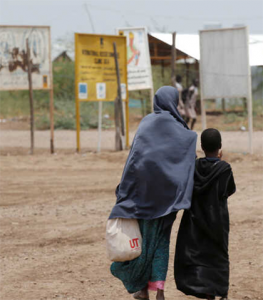Fears over plans to close Kenya’s refugee camps
Hundreds of thousands of refugees have been left in uncertainty and fear after Kenya announced plans to close two of the largest camps for displaced persons in the world.
The Kenya Interior Ministry has said it plans to close the sprawling Kakuma and Dadaab camps citing terrorism concerns.
 The camps were due to close on March 24 but a last minute court ruling has postponed that till the end of April.
The camps were due to close on March 24 but a last minute court ruling has postponed that till the end of April.
The government says the camps provide breeding grounds for terrorists linked to Al-Shabaab, a fundamentalist group based in East Africa and Yemen.
Kenyan authorities have said are were not prepared to talk to UN refugee agency UNHCR over extending the length of stay for the refugees, most of whom are from war ravaged Somalia.
UNHCR warned of dire consequences if the camps close.
‘’UNHCR is concerned about the impact this decision would have on the protection of refugees in Kenya, including in the context of the ongoing COVID-19 pandemic. We will continue our dialogue with the Kenyan authorities on this issue,’’ the agency said in a statement.
“We urge the government of Kenya to ensure that any decisions allow for suitable and sustainable solutions to be found, and that those who continue to need protection are able to receive it,” the statement said.
Kenya has made several attempts to close the two refugee camps on grounds they are being used by Al-Shabaab-linked terrorists, who have carried out more than 100 attacks in Kenya since 2011.
Security officials claim the the Dadaab refugee camp near Kenya’s border with Somalia in the northeast town of Garissa is a base for terrorists.
The camp, which is the second-largest in the country after Kakuma, houses more than 200,000 Somali refugees who fled war, drought and hunger.
Al-Shabaab militants have recently claimed responsibility for several terror attacks, including one in 2015 that killed 148 students at Garissa University, 62 miles south of the Dadaab refugee camp.
In 2017 a Kenya court quashed a government order to close the Kakuma camp saying the move was an abuse of office and a violation of human rights.
Other observers says the efforts to close the camps is a means of settling diplomatic feuds between the two border countries as Kenya has been in a maritime dispute with Somalia over an oil and gas field in the Indian Ocean.
In November 2020, Mogadishu recalled its ambassador to Kenya and expelled the Kenyan ambassador to Somalia on grounds that Kenya was meddling with the now-delayed Somalia elections.
But other experts says funding from UNHCR is another of the issues forcing Kenya to act.
Kenya hosts more than half a million refugees and asylum seekers from neighbouring countries. Somali refugees make up 85 per cent of the total number of refugees, with most of them hosted at the Kakuma and Dadaab camps.
Both Dadaab and Kakuma camps opened in the 1990s, offering UNHCR-administered havens to people fleeing civil wars and strife in Somalia and Sudan.
Another wave of Somalis arrived in Kenya in 2011, driven from their homeland by drought and swelling their numbers to nearly half-a-million.












